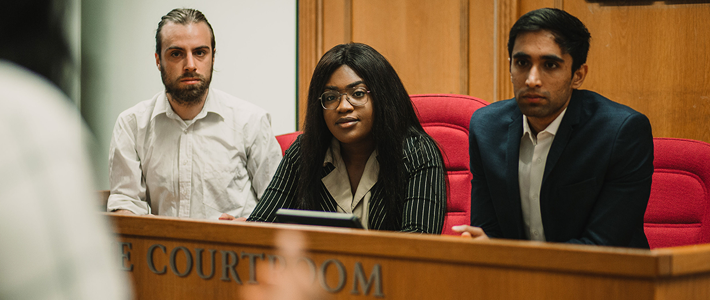
Law - PhD
Currently viewing course to start in 2025/26 Entry. Switch to 2026/27 Entry
We support a thriving PhD community, largely through its three main research centres: The Centre for American Legal Studies, The Centre for Human Rights and the Centre for Law, Science and Policy. We also contribute to the work of the University-wide Centre for Brexit Studies....
- Level Postgraduate Research
- Study mode Full Time/Part Time/Distance Learning
- Award PhD
- Start date February 2026, May 2026
- Fees View course fees
- Subject
- Location City Centre
This course is:
Open to International Students
Overview
We support a thriving PhD community, largely through its three main research centres: The Centre for American Legal Studies, The Centre for Human Rights and the Centre for Law, Science and Policy. We also contribute to the work of the University-wide Centre for Brexit Studies.
We are currently supporting students to undertake doctoral research on a variety of topics, including capital punishment, international human rights standards and trade agreements, and the interface of law and science in the context of public health and criminal justice.
Funded PhD Opportunities Available
There are currently both funded and self-funded PhD opportunities available. Find out more about these proposals, and how to apply by clicking here.
What's covered in this course?
Doctoral research allows students to development advanced skills in research, project management, critical thinking, argument construction and drafting, and to be innovative.
Our PhD students benefit from regular supervision meetings with academics who are experts in their field; and have the opportunity to become members of our proactive research community made up of academics, postgraduate researchers and external partners.
Why Choose Us?
- Our PhD students benefit from regular supervision meetings with academics who are experts in their field
- Students can make use of library, ICT and social-learning space facilities at our new City Centre Campus
- Where available, students can undertake teaching opportunities, collaborate with academics, and contribute to research dissemination events taking place at the University.
- We aim to enhance your academic and personal development and equip you with the skills and resources to undertake high-quality research.
- You will join a thriving research community, comprised of the Centre for American Legal Studies (CALS), Centre for Human Rights (CHR) and the Centre for Law, Science and Policy (CLSP).
- Research students, who have access to a dedicated research room, are encouraged to publish in collaboration with their supervisors and to take part in research conferences.
Find out more
Research Interests
We support cutting-edge research that falls broadly within the themes of our three law research centres, and aims to inform the resolution of global challenges. Our academics collaborate with international organisations, including the United Nations, Amicus, and the Nuffield Foundation, and their research has been cited widely by scholars, courts and practitioners.
You can find out more about our scholarship, external partnerships and members by visiting the centres’ websites.
Current interests
Our research interests include topics that fall broadly within the themes of our three main research centres, which are:
We actively participate in research in the following areas:
- Human rights law
- Environmental law
- Law of the USA
- Property law
- Commercial law
- Medical law and ethics
- Employment law
- Criminal law and criminology
- Teaching and learning the law
Fees & How to Apply
UK students
Annual and modular tuition fees shown are applicable to the first year of study. The University reserves the right to increase fees for subsequent years of study in line with increases in inflation (capped at 5%) or to reflect changes in Government funding policies or changes agreed by Parliament. View fees for continuing students.
Award: PhD
Starting: Feb 2026
- Mode
- Duration
- Fees
- Full Time
- 3-4 Years
- £5,006 in 2025/26
- Part Time
- 4-7 Years
- £2,503 in 2025/26
- Distance Learning
- 4-7 Years
-
TBC
Award: PhD
Starting: May 2026
- Mode
- Duration
- Fees
- Full Time
- 3-4 Years
- £5,006 in 2025/26
- Part Time
- 4-7 Years
- £2,503 in 2025/26
- Distance Learning
- 4-7 Years
-
TBC
International students
Annual and modular tuition fees shown are applicable to the first year of study. The University reserves the right to increase fees for subsequent years of study in line with increases in inflation (capped at 5%) or to reflect changes in Government funding policies or changes agreed by Parliament. View fees for continuing students.
Award: PhD
Starting: Feb 2026
- Mode
- Duration
- Fees
- Full Time
- 3-4 Years
- £15,120 in 2025/26
- Part Time
- 4-7 Years
- £7,560 in 2025/26
- Distance Learning
- 4-7 Years
- £9,450 in 2025/26
Award: PhD
Starting: May 2026
- Mode
- Duration
- Fees
- Full Time
- 3-4 Years
- £15,120 in 2025/26
- Part Time
- 4-7 Years
- £7,560 in 2025/26
- Distance Learning
- 4-7 Years
- £9,450 in 2025/26
If you’re unable to use our online application form for any reason, please get in touch.
You must complete a research proposal and upload this as part of your application. Please note that we will not be able to process your application without having received your research proposal.
Entry Requirements
Applicants are required to hold a minimum of a 2:1 Honours degree, in a discipline related to law, to be considered for a PhD. Some PhD opportunities, such as those funded by a particular research council, may additionally require a Masters level degree.
| English language requirements | ||
|---|---|---|
| IELTS |
6.5 overall with a minimum of 6.0 in each category If you do not meet the required IELTS score, you may be eligible for one of our pre-sessional English courses. Please note that you must have a Secure English Language Test (SELT) to study on the pre-sessional English course. More information. |
|
| Other accepted qualifications | Visit our English language page | |
Your research proposal should be no more than 1500 words excluding bibliography.
Research proposal guidance
Your research proposal should address the following areas:
The Working Title of Proposal
Justification for Study
Why do you consider this subject worthy of study at PhD level? This should be considered in some detail providing sufficient background for the non-specialist to be able to gain an idea of the background to the study, its general purpose and its importance.
Outcome of the Study
How will the completed PhD contribute to the body of knowledge associated with this subject? Remember that we will expect a PhD to generate novel data and/or novel interpretations or ideas within a subject area and it must be made clear in your proposal how this will be attempted
Research Methodology
This should include an assessment of the physical, technological, human and literary resources required to undertake quantitative or qualitative research. The research committee is unlikely to look favourably on a proposal that fails clearly to demonstrate what the necessary resources are and that they are readily available (or will be).
Literature Review
This should include a summary of the current debates, areas of contention or controversy, the principal commentators and the seminal works within the subject area.
Course in Depth
Why study a PhD?
Are you keen to contribute innovative ideas to your field? Looking to solve problems, discover something new, and make a difference to society?
We have a vibrant research community here at Birmingham City University, with many talented postgraduate researchers developing and exchanging knowledge across their fields.
Conducting a PhD will allow you to develop cutting-edge research in your area of interest, with the support of your research supervisor and fellow research community.
The PhD Journey
Students will be expected to achieve certain goals throughout each year of their PhD.
Generally, in year one, students will be expected to successfully complete the PgCert in Research Practice, define their research questions, and complete full drafts of their literature review and methodology chapters. In Year Two, students will be expected to apply their methodology, complete data-collection and undertake data analysis. In Year 3, students will be expected to write-up their findings and complete their thesis.
Students will also be expected to contribute to the academic community through attending and disseminating their research at internal and external conferences throughout their studies. Students in the later stages of their PhD will also be expected to consider writing papers for publication in law journals.
Students will also be expected to successfully complete regular progress reviews as required by the Faculty.
We use a ‘Model of Supervision’ to support students to achieve their goals.
Course structure
All research students are required to undertake a Postgraduate Certificate in Research Practice when they begin their research degree at Birmingham City University. The Postgraduate Certificate in Research Practice is specifically designed to meet the needs of all students at Birmingham City University who are embarking on a programme of research for Doctor of Philosophy (PhD) and Professional Doctorates. The course lasts one semester and is intended to complement and support the traditional practice of research degree supervision, which remains central to the teaching and learning of research.
The course will provide students with:
- Preparation for carrying out academic work for a research degree
- An introduction to the research skills, practices and procedures that are essential with postgraduate research study
- An opportunity to explore a range of theoretical and practical research issues and their application to particular phenomena
- A supportive environment in which to develop a specific area of research interest into a viable research proposal
- A structured programme that assists in the development of an individual research project.
How the PhD is assessed
The criteria to be awarded a PhD is to make a ‘unique contribution to knowledge.’ Whether a student has achieved this is determined by a panel of experts, including internal and external academics. The panel will assess the student’s written thesis, and the student’s oral defence of that thesis in a viva voce.
Modes of study
Our PhD programmes are offered full-time or part-time. These modes of study ensure that we can create a PhD research plan around your lifestyle needs, even if you are in full-time employment or overseas.
Full-time PhD Research: three to four years
As a full-time PhD research student you will undertake your research both on and off-campus.
You will be expected to complete your research and submit your work for examination within 36-43 months.
Part-time PhD Research: four to seven years
You would chose part-time PhD research if you opt to study whilst in employment or if full-time study is impractical.
You will be encouraged to use the campus facilities when you can and may often work from home.
You will be expected to complete your research and submit your work for examination within 48-72 months.
Employability
Employment Opportunities
The PhD award is well established and valued professional qualifications within the legal sector and will enhance your career prospects. Should you want to follow a career in teaching and researching academic law in higher education, a PhD is highly desirable.
The value of PhD to employability
The Doctor of Philosophy or PhD is recognised worldwide and is often an essential requirement for those wishing to follow an academic or research career in industry, government, policy-making, or commerce. Our law-based PhD research degree has been designed to help you achieve a career in research or academia.
After the PhD
Completing a PhD in law can open many doors, including to careers in academia, government, non-profit organisations, and private business.
Placements
PhD researchers funded under the Midlands4Cities Doctoral Training Partnership have the opportunity to undertake industry placements as part of their research.
For those students not funded by Midlands4Cities, the PhD still allows you the opportunity to work with other institutions and companies as part of your research. You can discuss your options with your potential supervisors, if you feel a placement would benefit your research.
Facilities & Staff




Our Facilities
We are constantly investing in our estate and have spent £500 million on learning facilities.
The Curzon Building
This course is based in the Curzon Building, a £63 million development, located on our City Centre campus.
The building offers students a unique social learning space, including a dedicated student hub incorporating student support services, in the heart of Birmingham’s Eastside development.
The facilities at the Curzon building include two bespoke Law Courtrooms, replicating a Crown court and a Magistrates court. These rooms will play a key part in your learning experience, allowing you to try your hand in mock court cases, whilst also being the venue for our Mooting and Debating Societies.
On top of this, the Curzon building houses an extensive Law library, with books covering every aspect of Law history.
The Curzon Building also features:
- An impressive library with access to over 65 million full text items and stunning views of Eastside City Park
- Your Students’ Union which is located in a beautifully restored 19th century pub, The Eagle and Ball
- A modern 300-seat food court with space to study and socialise
- Accessible IT facilities with full Office365 for all students for free
- Shared facilities with the wider campus including the Parkside Building and Millennium Point
Our staff
Professor Jon Yorke
Professor of Human Rights and Director of the Centre for Human Rights
Jon Yorke is the Professor of Human Rights and the Director of the Centre for Human Rights (CHR). His qualifications include LL.B. (Hons) (BCU), LL.M. and Ph.D. (Warwick).
More about JonDr Sarah Cooper
Professor of Interdisciplinary Research and Criminal Justice
Dr Sarah Cooper is a Professor of Interdisciplinary Research and Criminal Justice at Birmingham City University. Her research investigates intersections of law and science in criminal justice systems, including how judges respond to claims that forensic science is unreliable, jurors interpret expert evidence, and the role of science in clemency and...
More about SarahJill Molloy
Senior Lecturer
Jill Molloy is a Senior Lecturer in Law, and LLB Year 1 Tutor. She is the module leader for Evidence, Proof and Argument and co-teaches the lectures in Criminal Law on the LLB.
More about JillDr Ewan Kirk
Associate Professor in Law
Ewan is Associate Professor in Law. He joined the university in 2001 after completing his PhD in Copyright Law and the Internet.
More about Ewan
